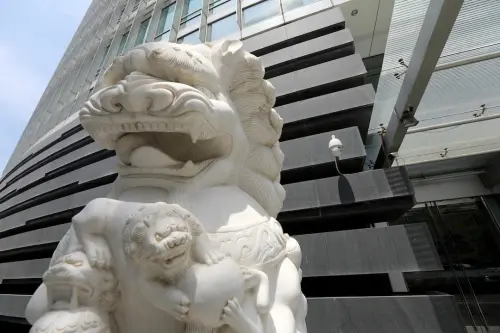In Beijing on March 14, new bank lending in China declined more than anticipated in February from the record high of the previous month, as policymakers aim to protect the economy from an escalating trade war with the United States by promoting consumption.
Chinese banks issued 1.01 trillion yuan ($139.62 billion) in new yuan loans in February, the lowest February figure since 2020, according to Reuters calculations based on data released by the People's Bank of China (PBOC) on Friday. Analysts surveyed by Reuters had predicted a decrease to 1.275 trillion yuan from a record 5.13 trillion yuan in January.
It was widely expected that there would be a decrease in February compared to January, as Chinese banks typically front-load loans at the start of the year to attract high-quality customers and gain market share. However, business and consumer caution about taking on more debt persists, particularly with escalating tensions between China and the U.S.
Total new loans for January and February equaled 6.14 trillion yuan, down from 6.37 trillion yuan the previous year. The uncertain economic outlook is shaped by sluggish domestic demand, ongoing deflationary pressures, a prolonged property market decline, and the escalating trade conflict with the U.S., which threatens to impact exports negatively.
During the recent annual parliament session, China's Premier Li Keqiang indicated plans for additional fiscal stimulus and reiterated efforts to boost consumption, reaffirming the country's commitment to achieving this year's growth target. Central bank Governor Yi Gang further committed to lowering interest rates and injecting liquidity into the financial system by reducing banks' required reserves "at an appropriate time."
Efforts have been ongoing since September to revive the economy, including interest rate cuts, debt relief for local governments, and measures to stimulate demand in the struggling property market.
On March 4, U.S. President Donald Trump's tariffs on Chinese imports took effect, prompting China to retaliate by increasing import levies on $21 billion worth of American agricultural and food products. The two leading economies are heading closer to a full-blown trade war.
Outstanding yuan loans grew by 7.3% in February year-on-year, a decrease from the 7.5% growth rate in January, marking a record low. Broad M2 money supply increased by 7.0% year-on-year, in line with analysts' expectations and January's figure. M1 money supply saw a modest growth of 0.1% year-on-year compared to 0.4% in January.
Annual growth of total social financing (TSF), a comprehensive measure of credit and liquidity in the economy, reached 8.2%, up from 8.0% in January and December. The government's accelerated issuance of bonds could potentially enhance TSF growth.
TSF encompasses various forms of financing beyond traditional bank lending, such as initial public offerings, trust company loans, and bond sales.
($1 = 7.2340 Chinese yuan renminbi)
